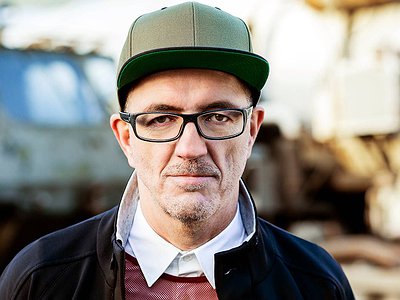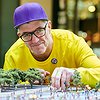How would you describe the relationship between your choices and goals as a DJ and the expectations, desires and feedback of the audience? Is there a sense of collaboration between you and the dancers?
I have no expectations. I focus on what I would want to dance to if I were playing for myself alone. As an artist, I see myself as the channel of a particular vibe to the people and I like to translate the mood of the moment into music.
I remember playing on the Pumpui stage at Ozora Festival in Hungary. I love the relaxed, peaceful atmosphere there and the many experienced people. Later, I uploaded this set to Soundcloud and I was really surprised by the reactions. Some wrote that it was an epic set and others that they had tears in their eyes on the dance floor because it was so emotional ... It blew my mind. Listen to it and read the comments for yourself.
In a song or classical composition, the building blocks are notes, but in a DJ set the building blocks are entire songs and their combinatory potential. Can you tell me a bit about how your work as a DJ has influenced your view of music, your way of listening and perhaps also, if applicable, your work as a producer?
Relating this to the culture of electronic music, the tracks are the blocks and the DJs are the parts of the symphony.
Maybe you can look at it this way: My whole life follows a rhythm and I dance to it. So why not translate that experience into music? I live in the bubble of electronic music. It's a cultural and musical space that I'm a part of, and it is part of me. I have a new release coming out in August on Drumcomplex's label "Complexed Records." An EP I made together with my old buddy Tom Wax. It's about music released with the universe. "Dark Spacer" and "Trip To Venus." Deep, dark and powerful.
Take us through a day in your life, from a possible morning routine through to your work, please. Do you have a fixed schedule? How do music and other aspects of your life feed back into each other - do you separate them or instead try to make them blend seamlessly?
I am very slow in the morning. Always. I remember when I was young, I had to get up at 5 a.m. to be on the job site by 6. On the way there, my body struggled against it and I threw up. The first thing I need is a shower and then a coffee. Sometimes vice versa. I quickly get an overview of the messages coming in on social media and email. Then I make a plan for the day, look at my to-do lists and talk to my wife, Ellen, to see if she has any news or updates for me. If I'm not stopped, I can stay awake forever.
I try to compose music every day. Like I said, I'm a slow guy. It's good that I have a management and a booking agency that support me that much. Many thanks to Ellen and Claudi (Pearls Booking Berlin).
Can you talk about a breakthrough DJ set or performance in your career? Why does it feel special to you? When, why and how did you start working on it, what were some of the motivations and ideas behind it?
No, there wasn't this one, all-changing gig. I just started playing music for people in a small club in 1985. A year later we opened our own club, another two years later we threw the first acid house party and so on. Then techno came up, which I still play and I love to dance my ass off. Even today, with bookings under Corona rules with seating and such, people still scream "more, more, more!" after every set. That and my own deep passion for music and dancing drives me forward.
I remember this one special moment when I played the last DJ set at the Loveparade in 1999, in front of 1.5 million people. It was so incredible that I still can't believe this really happened and at the same time I will never forget it. There was pure magic in the air.
Music and sounds can heal, but they can also hurt. Do you personally have experiences with either or both of these? Where do you personally see the biggest need and potential for music as a tool for healing?
I love music. I love dancing. I love to dance and experience the arising energy when people dance together. This power, when everyone moves to the same rhythm and you can literally feel how our hearts beat in sync with it. This is something that is deeply rooted in the human condition and connects us with our origin. It has a positive effect on everyone involved.
Music is an essence of human culture that unites all people and brings them together as one tribe: the family of people on this planet.
There is a fine line between cultural exchange and appropriation. What are your thoughts on the limits of copying, using cultural signs and symbols and the cultural/social/gender specificity of art?
We must be respectful of what humanity has developed since the dawn of homo sapiens. At that time, it was necessary to stick together as a group in order to survive. That is what I call primal culture, which is the basis of all human culture today. Now we are all afraid of each other and accuse or defame others, playing judge ourselves, only fomenting more hatred. Modern societies are in constant danger of losing their own sensitivity and sensuality.
Brain research shows unequivocally that social skills decrease in people who are physically isolated because the area responsible for this no longer receives real stimuli. Communication via monitor has no effect on this. Real contact with a real person must take place.
A friend of mine, a Berlin fashion designer, has designed a sweater with the slogan "Think less, dance more". That's exactly what we did in the '90s, when we danced in the streets at the Love Parade as a big, human family that invented its own new sound after the second Summer of Love, which took place in the UK in 1988, that we now call electronic music culture. I remember hearing a track that began with the words, "Once in a while in life, you should stop and look around, or you could miss it." [This is actually a quote by Ferris Bueller. Dr. Motte is probably referring to the track “Links” by The Chameleon.]
Art can be a purpose in its own right, but it can also directly feed back into everyday life, take on a social and political role and lead to more engagement. Can you describe your approach to art and being an artist?
What is life about? In our ordinary daily life, everywhere we have to follow rules, laws, police orders, restrictions, regulations, surveillance, normality, authorities, pay taxes and pay for everything in general. Art and creativity is the way to break out of that and play around with everything. It is a human right to have access to art, culture and cultural involvement through participation, listening, creating and information. It is a form of education that has something to do with oneself.
I was raised and musically educated by my mother. She took me to exhibitions, classical and world music concerts. She bought me a drum set with the little money she had and always supported me when I was involved in music and art. If I remember correctly, I have been creative all my life and have been inspired by everything.
What can music express about life and death which words alone may not?
The ancient Indian Vedas call it "Nada Brahma". Nada, the sound, Brahma, the divine. Everything is sound. Music synchronizes the two hemispheres of the brain and can connect us to something beyond words. Music creates images in our mind and is connected to our emotions.
Just the other day I found the great Tibetan mantra "OM MANI PADME HUM" on an old tape, sung by a lama from Tibet. I sat down and sang along with it, and suddenly I had to cry profusely. For half an hour I could not calm down, because it was something that I had missed so much and it touched my soul very deeply. The mantra is associated with the great Bodhisattva Avalokiteshvara, who is the embodiment of compassion of all Buddhas. Lama Govinda writes in his book "Foundations of Tibetan Mysticism" that the sound of the syllable "OM" reaches from the beginning of all being, through the sound of my voice today, to the end of time and space.
Interviews / About
Fifteen Questions Interview with Dr. Motte
Dance Your Life
Part 2

"I love to dance and experience the arising energy when people dance together. This power, when everyone moves to the same rhythm and you can literally feel how our hearts beat in sync with it. This is something that is deeply rooted in the human condition and connects us with our origin."


